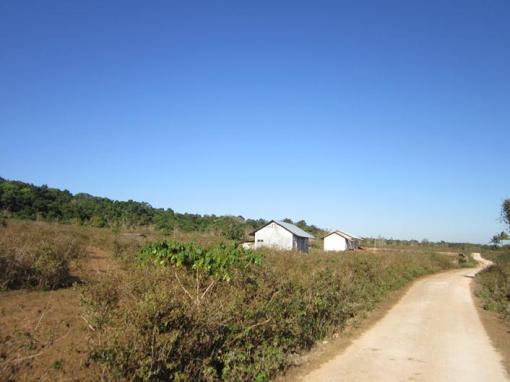Suatu kali gua melihat Dhimas, si bungsu di rumah, menggunakan parang untuk membuat fiti (=ketapel). Gile, gua pikir, di rumah gua di Jakarta anak umur enam tahun pegang pisau aja dah diteriakin. Ini megang parang! Anak-anak ini bikin mainan mereka sendiri, seperti fiti (=ketapel) dan tembakan (=pistol).
Ivan (yang nama aslinya, Fajar; menurut cerita, dia sendiri yang minta nama diganti, dan ternyata orang-orang Rote ini punya nama dobel2 emang), si anak tengah di rumah, tukang manjat pohon. Sekali gua liat dia manjat pohon kelapa tinggi sekali sampe gua teriak-teriak takut dia jatuh. Menurut cerita mamanya, Ivan emang pernah jatuh di sekolah sampe dijahit. Tapi kalo urusan ambil kelapa di atas pohon, yeap mintalah si Ivan ini.
Setiap kali gua nyuci baju di sumur mata air dekat rumah, gua akan ngeliat anak-anak kecil juga mandi di sana. Dan bayangkan, anak perempuan kelas 4 SD sudah mulai tarik air. Adiknya yang masih kelas 1 SD juga ikutan tarik air isi ke jirigen kecil. Heck, I had even seen a three year old kid carrying small buckets of water!
Kalau habis mandi, anak-anak ini juga sering cuci baju sendiri. Bayangkan, anak usia TK, 4 atau 5 tahun kali, sudah menyikat baju sendiri. Now I’m thinking of back home with washing machine, and for some, with maids. Anak-anak usia SD kelas besar juga sering gua dapati menggendong adiknya yang masih bayi. Little moms!
And know what, anak-anak gua lebih tau cara nyetir motor daripada gua! Jadi pas gua dapat motor gua buat pertama kali (dan juga mungkin ke-3 kalinya dalam hidup gua nyetir motor sendiri), anak2 gua itu lari-lari sebelah gua dari sekolah sampe rumah, kasih tau kapan harus naikin gigi, turunin gigi, nge-gas. Now this is what I call teacher learning from her students!
Anak-anak gua ini juga menempuh perjalanan yang lumayan (lumayan jauh, lumayan sulit). Buat yang tinggal di Nggelak, dimana gua tinggal, untuk jalan pintas kita lewat hutan. Tidak terlalu lebat sih hutannya. Kadang kalau tidak terlalu becek, lewat sawah biar lebih singkat lagi jalannya. Anak-anak yang tinggal di dusun Lopolain ambil jalan pintas lewat padang. Dalam perjalanan, mereka akan lewat pohon mangga, beberapa anak akan nyolong mangga milik tetangga itu. Anak-anak yang tinggal di dusun Daedulu katanya melalui perjalanan sejauh satu jam. Ini tempat paling jauh, dan frankly, gua masih belum menyempatkan diri melalui rute yang satu ini. Tapi selama ini, rute paling seru itu ke dusun Oana. Mereka lewat hutan, beneran hutan. Katanya di sana banyak kode (=monyet), tapi sayang pas gua lewat sana nggak ada tuh kode yang nongol. But it’s a real jungle, and it’s a jungle gym for my kids. Mereka gelantungan di pohon sana-sini. Now I guess these are the monkey I should be expecting to see, no?
Suatu saat, anak-anak ini akan tumbuh besar menjadi bapa-bapa dan mama-mama yang tahu dan bisa bangun rumah sendiri (kayak rumah gua nih bangun sendiri brick by brick), menumbuhkan hasil pangan sendiri, bahkan bikin minyak goreng dari kelapa.
Setiap kali gua berdecak kagum melihat anak-anak Rote yang lihai ini, orang-orang tua akan komentar, “Kalau tidak begini, mereka tidak bisa hidup.” Yeap, life’s tough.
Kadang gua mikir, sehebat-hebatnya orang kota, kalo ditaroh di desa kecele juga kali yah. These village kids have their own toughness, agility, and skills that city kids do not have. They build their own lives, live their own lives, and sometimes I wonder, why do we from the city dare to even think that we are bringing to them civilization? And they’re happy with what they have too. My kids drew water from the well with laughter. They walked the long walk to school, some through forests, some through savannahs, and they still play around. The world is their playground, indeed!
So what’s wrong with them that we should bring them enlightenment? Sure, we don’t have to draw waters from the well, or look for woods to build fires. But the city folks too have our own problems.
So what more do my kids, these little mothers and little warriors, need?
Opportunities. And power.
And I feel like I just typed some very wicked things.
*sigh* Enough writing for the day.
Rote Ndao,
Friday, 12 October 2012
-me-





Recent Comments